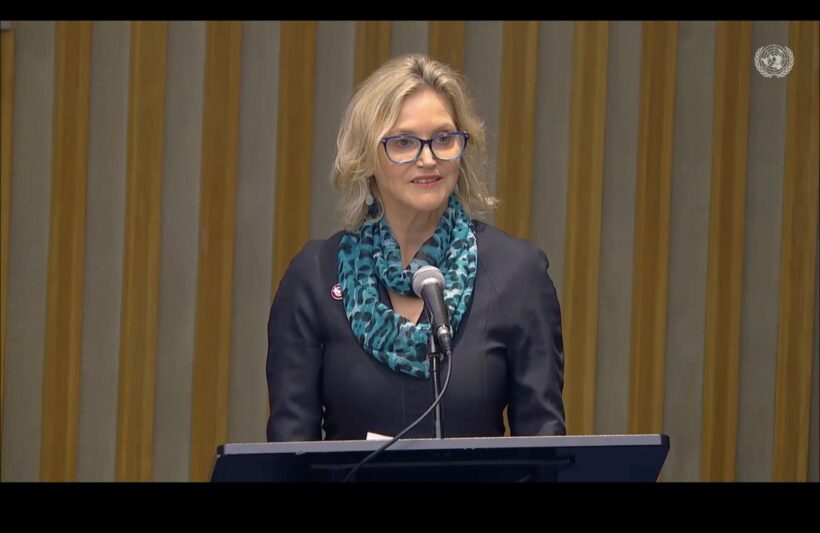On September 26th 2023, Melissa Parke, the new Executive Director for the International Campaign to Abolish Nuclear Weapons delivered the following statement to the High-level plenary meeting to commemorate and promote the International Day for the Total Elimination of Nuclear Weapons:
Excellencies, Distinguished Delegates,
It is my honour to address you on this important occasion.
The late South African anti-apartheid leader Desmond Tutu once said: “Disarmament is not an option for governments to take up or ignore. It is a moral duty owed by them to their citizens, and to humanity as a whole. We must not await another Hiroshima or Nagasaki before finally mustering the political will to banish these weapons from global arsenals.”
The approximately 12,500 nuclear weapons in the world today pose a direct and constant threat to people everywhere, and to our precious environment.
The best hope of eliminating them completely is through the landmark Treaty on the Prohibition of Nuclear Weapons, which entered into force in 2021. The UN Secretary-General has described this treaty as“an extraordinary achievement and a step towards the eventual elimination of nuclear weapons”. Following last week’s treaty actions by the Bahamas and Sri Lanka, close to half of all states in the world are now parties or signatories, and more must urgently join them.
At their first meeting in Vienna last year, TPNW states parties vowed not to “rest until the last state has joined the treaty, the last warhead has been dismantled and destroyed, and nuclear weapons have been totally eliminated from the Earth”.
The TPNW is a vital tool for building a global consensus on the unacceptability of nuclear weapons, delegitimising not only their use but also their possession. It is a beacon of hope in dark times, as relations among nuclear-armed states continue to deteriorate and the possibility of nuclear war increases.
The dire international security environment at present is no justification for inaction; it only makes disarmament all the more imperative. Nuclear weapons are a paramount threat to our planet, and yet some states – against their own interests and our common interests -cling to a misguided belief in “nuclear deterrence” – the theory that if they threaten each other with mass destruction often enough and convincingly enough, nothing could possibly go wrong. Indeed, deterrence may well work – until the day it doesn’t, and the consequences of that inevitable failure would be truly catastrophic and global in scope.
No state is immune to the radiation that would transcend national borders and inflict harm upon generations to come. Millions would die instantly or suffer agonising burns or succumb years later to a plague of cancers. Soot from burning cities – lofted high into the upper atmosphere – would block the Sun’s rays, leading to widespread agricultural collapse, famine, and the destruction of the Earth’s ecosystems.
Distinguished delegates,
I urge each and every one of you to do your part to prevent these horrific weapons from ever being used again.
If your country has not yet signed and ratified the Treaty on the Prohibition of Nuclear Weapons, please do so now. Do not delay.
As the atomic bomb survivor Setsuko Thurlow put it in 2017 when she jointly accepted the Nobel Peace Prize for ICAN: “All responsible leaders will sign this treaty… No longer shall we live under a mushroom cloud of fear.”
I thank you.
Video speech start at 02:34:00










